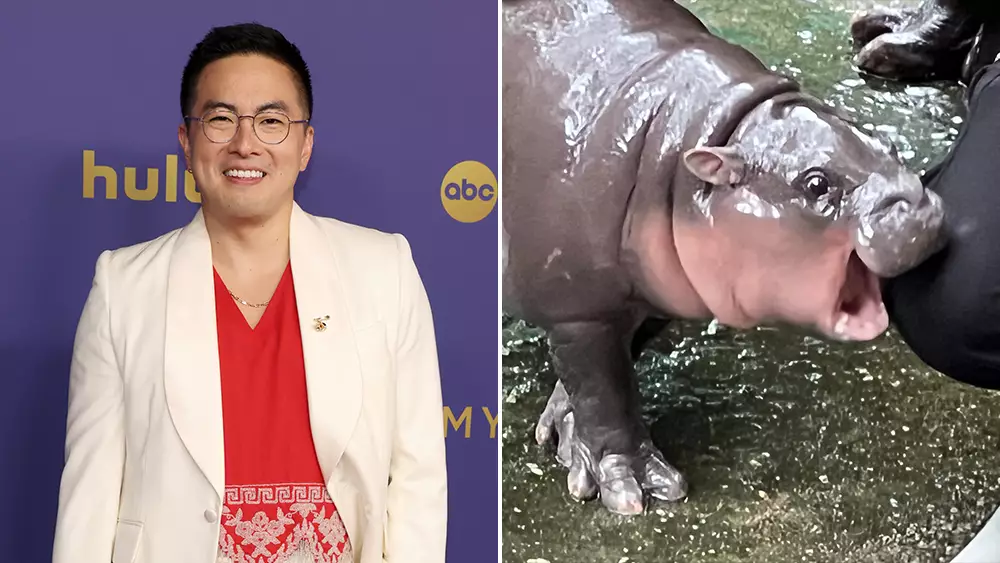In an unforgettable opening for the 50th season of Saturday Night Live, comedian Bowen Yang stepped into the oversized shoes—quite literally—of Moo Deng, a pygmy hippopotamus garnering viral fame on social media. The portrayal was anything but simplistic: it served as a metaphorical lens to spotlight issues of boundaries and respect in a culture that often demands excessive access to public figures, both human and animal. Moo Deng, when coaxed to express his feelings, showcased an unfiltered and poignant take on the complexities of being an internet sensation trapped within the confines of an enclosure—a duality that resonates with many individuals living in the public eye.
Yang’s portrayal underscored the challenging dynamics of fame. Moo Deng’s protestations against invasive adoration—“Reminder: Women owe you nothing!”—subtly pushed back against the possessiveness that often surfaces in parasocial relationships. It is a poignant reminder that those who entertain, whether they are celebrities or adorable animals, have their own lives beyond the adoring gaze of fans. Moo Deng’s whimsical yet heartfelt complaints earned laughter while simultaneously provoking thought, forcing viewers to reflect on the emotional labor associated with public personas.
Yang humorously defined Moo Deng’s unique “talents,” likening them to a slippery bounce that brings joy and fascination to observers. However, this jest needs to be unpacked; it speaks profoundly to the often superficial ways we measure the worth of individuals based on their ability to entertain. Moo Deng’s existence, as Yang humorously pointed out, was not represented in popular culture beyond children’s games and animated films. This speaks to a broader societal issue—namely, the limited narratives surrounding certain animals that confine them to mere “entertainers” without recognizing the intricate lives they lead.
This dimension of the skit was particularly telling; Yang’s Moo Deng served not just as a vehicle for comedy, but as a guardian of authenticity amid reductive public perceptions. The critique found within the laughter suggests that we need to ask broader questions about how we appreciate those who bring us joy. Are we reducing them to caricatures, forgetting they have aspirations and frustrations of their own?
In a fascinating twist, Moo Deng emerged not only as a symbolic figure for animal rights but also as an avatar for fellow artists, such as Chappell Roan, who resonate deeply with the sentiments of mistreatment by fans and critics alike. By hijacking the comedy scene to redefine his narrative, Moo Deng becomes a powerful statement in advocacy—a shared space where those affected by the shadows of fame can seek refuge and solidarity. “I’m your favorite hippo’s favorite hippo,” Yang quipped, forming a bridge between communities and reinforcing the message that solidarity exists even in the most unlikely characters.
Moreover, Moo Deng’s declaration to abstain from endorsing political candidates as a mere 10-week-old hippo further adds layers of irony. This line underscores a reality where even the most innocent figures feel the pressure of modern-day politics. The absurdity of Moo Deng grappling with political stress juxtaposed with Yang’s comedic brilliance produced a multifaceted commentary on responsibility, autonomy, and the harsh realities of fame that are largely overlooked.
The skit was interspersed with biting commentary about other aspects of societal and political life, showcasing not just Yang’s performance but also the cleverness of the SNL scriptwriters. With references to current events such as New York City’s political landscape and ongoing scandals, the humorous dissection continued to peel back layers, revealing the absurdity of civic bureaucracy masked by charisma and bravado.
The portrayal of Moo Deng as angst-ridden yet playful invites audiences to reconsider their relationship with fame, public personas, and expectations. By utilizing humor as a vehicle for sincere reflection, SNL has spurred a cultural dialogue around boundaries, autonomy, and representation, bringing forth a version of a pygmy hippo that is both entertaining and thought-provoking. In a world filled with ever-demanding spectators, Moo Deng’s call for justice may echo long after the final credits roll, urging us to recognize the singularity and voice within every creature—be they human or animal.

